c.1800 FRENCH OR ITALIAN SCHOOL
Mucius Scaevola before Lars Porsenna
Gouache, pen and brown ink and brown wash, with framing lines in brown ink.
343 x 503 mm. (13 1/2 x 19 3/4 in.) [image]
351 x 511 mm. (13 7/8 x 20 1/8 in.) [sheet]
343 x 503 mm. (13 1/2 x 19 3/4 in.) [image]
351 x 511 mm. (13 7/8 x 20 1/8 in.) [sheet]
The story of the bravery of the ancient Roman hero Gaius Mucius Scaevola, taken from Livy’s History of Rome, is one that was long popular with artists. In 508 BC, during the war between the Romans and the Etruscans, the city of Rome was besieged by Lars Porsena, king of the powerful Etruscan city of Clusium. The Roman youth Gaius Mucius Cordius, with the approval of the Senate, volunteered to steal into the Etruscan camp to assassinate Porsena. After killing the king’s scribe in error, Cordius was captured and led before Porsena.
As Livy recounts, the Roman stood before the king and famously declared, ‘“I am a Roman citizen,” he cried; “men call me Gaius Mucius. I am your enemy, and as an enemy I would have slain you; I can die as resolutely as I could kill: both to do and to endure valiantly is the Roman way. Nor am I the only one to carry this resolution against you: behind me is a long line of men who are seeking the same honour. Gird yourself therefore, if you think it worth your while, for a struggle in which you must fight for your life from hour to hour with an armed foe always at your door. Such is the war we, the Roman youths, declare on you. Fear no serried ranks, no battle; it will be between yourself alone and a single enemy at a time.”
The king, at once hot with resentment and aghast at his danger, angrily ordered the prisoner to be flung into the flames unless he should at once divulge the plot with which he so obscurely threatened him. Whereupon Mucius, exclaiming, “Look, that you may see how cheap they hold their bodies whose eyes are fixed upon renown!” thrust his hand into the fire that was kindled for the sacrifice. When he allowed his hand to burn as if his spirit were unconscious of sensation, the king was almost beside himself with wonder. He bounded from his seat and bade them remove the young man from the altar. “Do you go free,” he said, “who have dared to harm yourself more than me. I would invoke success upon your valour, were that valour exerted for my country; since that may not be, I release you from the penalties of war and dismiss you scathless and uninjured.”
Then Mucius, as if to requite his generosity, answered, “Since you hold bravery in honour, my gratitude shall afford you the information your threats could not extort: we are three hundred, the foremost youths of Rome, who have conspired to assail you in this fashion. I drew the first lot; the others, in whatever order it falls to them, will attack you, each at his own time, until Fortune shall have delivered you into our hands.”’
Mucius Cordius returned to Rome and earned the cognomen ‘Scaevola’, meaning ‘left-handed’, for himself and his descendants. Lars Porsena, impressed by the courage and bravery displayed by the citizens of Rome, decided to offer peace terms to the city.
This drawing bears the drystamp of the 19th century Danish collector Benjamin Wolff (1790-1866).
As Livy recounts, the Roman stood before the king and famously declared, ‘“I am a Roman citizen,” he cried; “men call me Gaius Mucius. I am your enemy, and as an enemy I would have slain you; I can die as resolutely as I could kill: both to do and to endure valiantly is the Roman way. Nor am I the only one to carry this resolution against you: behind me is a long line of men who are seeking the same honour. Gird yourself therefore, if you think it worth your while, for a struggle in which you must fight for your life from hour to hour with an armed foe always at your door. Such is the war we, the Roman youths, declare on you. Fear no serried ranks, no battle; it will be between yourself alone and a single enemy at a time.”
The king, at once hot with resentment and aghast at his danger, angrily ordered the prisoner to be flung into the flames unless he should at once divulge the plot with which he so obscurely threatened him. Whereupon Mucius, exclaiming, “Look, that you may see how cheap they hold their bodies whose eyes are fixed upon renown!” thrust his hand into the fire that was kindled for the sacrifice. When he allowed his hand to burn as if his spirit were unconscious of sensation, the king was almost beside himself with wonder. He bounded from his seat and bade them remove the young man from the altar. “Do you go free,” he said, “who have dared to harm yourself more than me. I would invoke success upon your valour, were that valour exerted for my country; since that may not be, I release you from the penalties of war and dismiss you scathless and uninjured.”
Then Mucius, as if to requite his generosity, answered, “Since you hold bravery in honour, my gratitude shall afford you the information your threats could not extort: we are three hundred, the foremost youths of Rome, who have conspired to assail you in this fashion. I drew the first lot; the others, in whatever order it falls to them, will attack you, each at his own time, until Fortune shall have delivered you into our hands.”’
Mucius Cordius returned to Rome and earned the cognomen ‘Scaevola’, meaning ‘left-handed’, for himself and his descendants. Lars Porsena, impressed by the courage and bravery displayed by the citizens of Rome, decided to offer peace terms to the city.
This drawing bears the drystamp of the 19th century Danish collector Benjamin Wolff (1790-1866).
Provenance
Benjamin Wolff, Engelholm, Denmark (Lugt 420), with his drystamp on the mount
Thence by descent until 2018.
Thence by descent until 2018.






